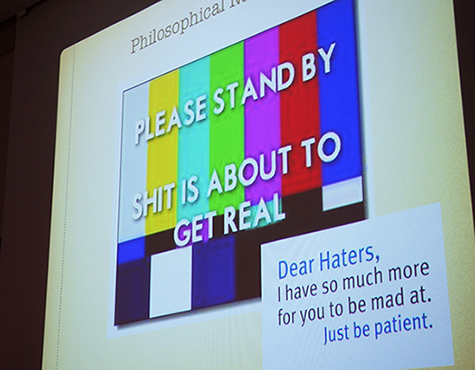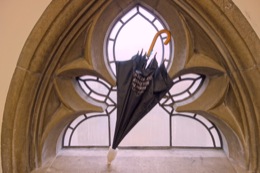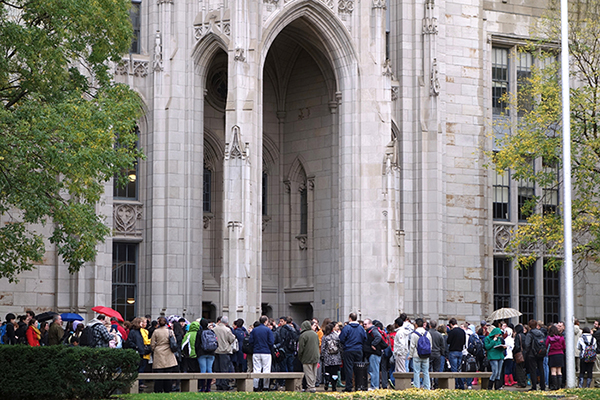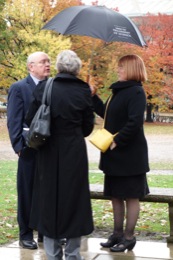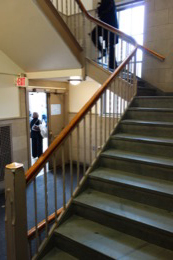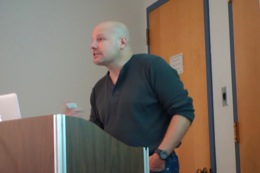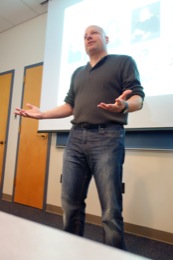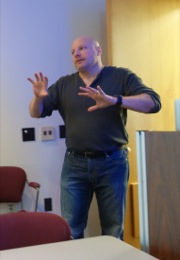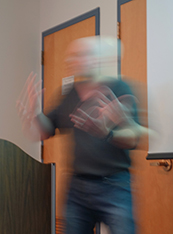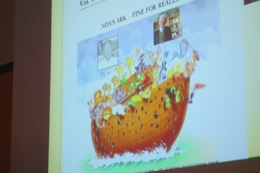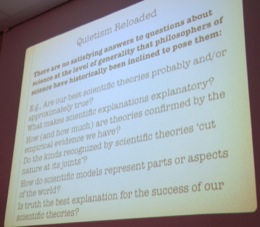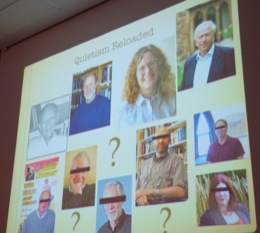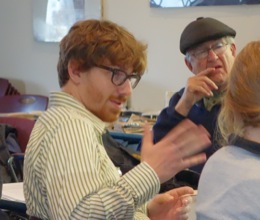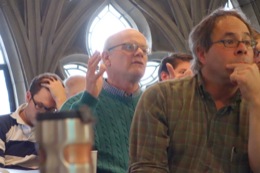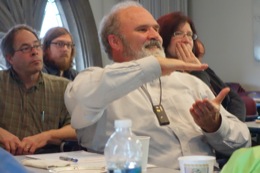
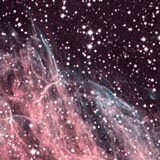
![]()
home
::: about
::: news
::: links
::: giving
::: contact
![]()
events
::: calendar
::: lunchtime
::: annual
lecture series
::: conferences
![]()
people
::: visiting fellows
::: postdoc fellows
::: resident fellows
::: associates
![]()
joining
::: visiting fellowships
::: postdoc fellowships
::: senior fellowships
::: resident fellowships
::: associateships
![]()
being here
::: visiting
::: the last donut
::: photo album
|
Outsourcing Philosophy of Science Kyle Stanford Today's speaker in our lunchtime talk is Kyle Stanford. He had given us a quite provocative abstract. Do peek at it if you haven't already. It includes the bright confession that "I aim to reshape the face of philosophy of science." This abstract produced a mood of expectation in the Center. Something unusual was in the air. Might our comfortable natural order be shaken? It would be, but not in the way we expected. As the day of the talk neared, we heard alarms of increasing volume from the National Weather Service. Hurricane Sandy was approaching and it promised to deliver unprecedented disasters to the East Coast. On Monday, the day before the talk, the forecast called for the winds to peak precisely at the time of Kyle's talk. Kyle stuck his head into my office. Would he have an audience? We exchanged the nervous pleasantries of the powerless. Sandy came early and blew through Pittsburgh on Monday night with rather less fuss than we'd expected. We'd been much luckier than the East Coast, which (at the time of writing) is still trying to assess the extent of the disaster. It was still a watery experience making my way into the Center on Monday morning.
There had been a fire alarm and we were to evacuate the building immediately. "Do not use the elevators."
By 12:05, we were settled in the conference room and ready to start. We had planned to start a little late to allow for stragglers. But the room was already quite full and there was no sign of late arrivals. "Sometimes Nature pushes back..." I said in introducing Kyle's talk. Kyle is an energetic and entertaining speaker. He likes clever titles, provocative claims and amusing visuals. He speaks with an animation unparalleled among his colleagues. That means that I cannot convey fully here what he said, for how he said it was a part of it. However I can give you an inventory of the major ideas. The first was philosophical naturalism. Kyle urges that we are all, in the end, naturalists of a Quinean stripe. Science, philosophy of science, philosophy--they are all in the end part of a single, interconnected project of inquiry. The second idea was "quietism." This is doctrine that Kyle found expressed in Arthur Fine's "NOA," the natural ontological attitude. The idea is that what the scientists themselves say about their goals, about what explains, about truth, about what supports what evidentially, and so on are enough. There's no need for philosophers to add to it. When we try and press for more, we philosophers end up asking pseudo questions. We ask the unanswerable when we demand to know what is the goal of science, as opposed to the specific goals of the many smaller activities that comprise science. We do no good when we ask if we are licensed to append a "really" to scientists' claims, as realists like to do.
Kyle identified quite a few philosophers of science who support quietism or who are plausible candidates for it. Their photos filled a screen. The division between the affirmed and the plausible candidates was indicated by his anonymizing of photos in the image.
I am included among the anonymized. I am identified correctly, pretty much. My views on the "material" nature of inductive inference and my grumbling about causation as a "folk science" fit well enough with label of particularism, although I do think that we philosophers of science have a professional expertise distinct from that of the scientists.
The naturalistic, quietistic movement seemed to be well established. Quine worked in the last century and Fine's NOA dates to the 1980s. So how is this going to change to face of philosophy of science? That change would come with the third idea. Combine the first two ideas and there no longer seems to be any good reason to separate the philosophy of science as a distinct speciality to be practiced by its own cabal. We need to recruit the scientists themselves back into philosophy of science, as full partners. The "outsourcing" of philosophy by science is a recent development of the last century. It needs to stop.
"Quietism is not a consequence of pluralism," Sandy proclaimed in the midst of a longer speech. One down. Eight more to go. As the countdown continued, Kyle returned to a curious admission that he'd injected into the presentation earlier. I wrote it down as he spoke it, as accurately as I could: "I myself am not a quietist, or at least not yet. But I find I can get into a quietist mood." With nine questioners on my list, there was no time for me to ask the obvious question: "So... why aren't you a quietist?" John D. Norton
|
